
The Salesians of Don Bosco (SDB), formally known as the Society of Saint Francis de Sales, is a religious congregation of men in the Catholic Church, founded in the late 19th century by Italian priest Saint John Bosco to help poor children during the Industrial Revolution. The congregation was named after Saint Francis de Sales, a 17th-century bishop of Geneva.
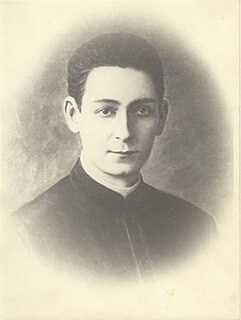
August Franciszek Maria Anna Józef Kajetan Czartoryski was a Polish Roman Catholic professed member of the Salesians of Don Bosco and a noble prince. He was born in Paris during his house's exile and came from a notable house; his constant frail health saw much of his childhood being shuttled to various health spas. Raphael Kalinowski tutored him; the prince turned to the priesthood instead of pursuing the aristocratic life.

Michele Rua was an Italian Roman Catholic priest and professed member of the Salesians of Don Bosco. Rua was a student under Don Bosco and was also the latter's first collaborator in the order's founding as well as one of his closest friends. He served as the first Rector Major of the Salesians following Bosco's death in 1888. He was responsible for the expansion of the Salesians and the order had grown to a significant degree around the world at the time he died. Rua served as a noted spiritual director and leader for the Salesians known for his austerities and rigid adherence to the rule. It was for this reason that he was nicknamed, 'the living rule'.
The Leo XIII Salesian College is a private male educational institution managed by the Salesian Community in Colombia. It is headquartered in historic center of La Candelaria of Bogotá, Colombia. The school was awarded the Educative Excellence Award, for the private schools category in 2006. In 2010 it celebrated its 120th anniversary. It is the parent of the Salesians in Colombia, provides an excellent education based on the philosophy of San Juan Bosco, is considered one of the best educational institutions of Colombia for work that the school develops, for its high academic performance as shown by the results in sting ICFES performance "Very High". The Department of Education Bogotá, puts the campus as a place of very high level of education in the country, since in his hundred and twenty-year history has developed and demonstrated the process to make children and young people as well

María Romero Meneses was a Nicaraguan Roman Catholic religious sister and a professed member from the Salesian Sisters of Don Bosco dubbed the "Social Apostle of Costa Rica".

Eusebia Palomino Yenes was a Spanish Roman Catholic professed religious and a professed member from the Salesian Sisters of Don Bosco. Palomino worked as a domestic in her adolescence having withdrawn from her education in order to support her parents though she later worked with the Salesian Sisters before she began the process of becoming a religious of that order in the 1920s; she afterwards continued most of the same duties and became known for her devotion to the five wounds of Jesus Christ and to the Via Crucis.

Luigi Maria Monti was an Italian Roman Catholic professed religious and the founder of the Sons of the Immaculate Conception. He was referred to as "Father" despite not being an ordained priest. Monti served as a nurse for most of his life and aided the ill in the Santo Spirito hospital in Rome while he was there and also worked to tend to ill people during the Brescia cholera epidemic in 1855. Monti also considered entering the religious life and joined the order of Lodovico Pavoni for a brief period of time though became a religious of his own order later on.

Luigi Novarese was an Italian Roman Catholic priest and the co-founder of the Apostolate of the Suffering as well as the Silent Workers of the Cross. Novarese also established the Marian Priest League and the Brothers and Sisters of the Sick; he built several homes for those who were ill and disabled. He served in the Secretariat of State until leaving that position to work alongside the Italian Episcopal Conference and to dedicate more time to the ill and to the work of his orders.
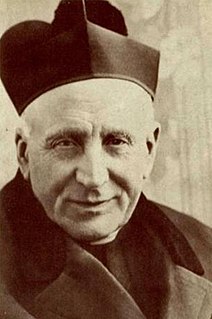
Filippo Rinaldi was an Italian Roman Catholic priest and a professed member from the Salesians of Don Bosco; he served as the third Rector Major for the order from 1922 until his death in 1931. He founded the Secular Institute of Don Bosco Volunteers. Rinaldi was close friends since his childhood to Giovanni Bosco and Paolo Albera and it was Bosco who guided Rinaldi who was torn in his adolescence between the farming life and the religious life. The order held him in high esteem from the outset and noted the potential within him as well as seeing the charism of Bosco encompassed in Rinaldi.

Paul Albera 6 June 1845 - 29 October 1921) was a Catholic Roman Priest of the Salesians of Don Bosco, who served as Rector Major of that Congregation between 1910 and 1921.

Giuseppe Nascimbeni was an Italian Roman Catholic priest who exercised his pastoral mission in his home of Verona and who also established the Little Sisters of the Holy Family.

María Dolores Rodríguez Sopeña was a Spanish Roman Catholic nun and the founder of the Sisters of the Catechetical Institute. Her religious activism came about from her earliest experiences in Almería where she tended to the poor including a leper though she later moved to Madrid and Puerto Rico where she continued her care for the poor and the sick. Her return to her native land saw her continue her work and her commitment to establishing religious and secular movements for others all directed towards active participation and care for poor people.
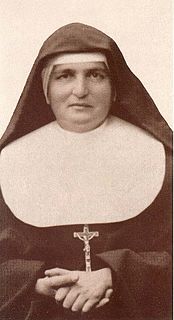
Maddalena Caterina Morano was an Italian Roman Catholic professed religious who was a member of the Salesian Sisters. Morano served as an educator for her entire life believing it to be her vocation; she served as a catechist in addition to being an educator.
Luigi Boccardo was an Italian Roman Catholic priest and the brother of Giovanni Maria Boccardo. Luigi established the Sisters of Jesus the King as a contemplative branch to his latter brother's Poor Daughters of Saint Cajetan.
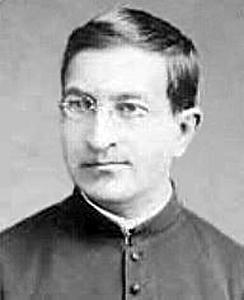
Bronisław Markiewicz was a Polish Roman Catholic priest and a professed member of the Salesians of Don Bosco. Markiewicz established the Congregation of Saint Michael the Archangel that devoted itself to the principles and teachings of John Bosco as well as the figure of Saint Michael the Archangel.

Blessed Luigi Monza was an Italian Roman Catholic priest and the founder of the Secular Institute of the Little Apostles of Charity. Monza's pastoral mission was defined with catering to the needs of the poor and the sick and used his new congregation as a means of spreading this mission.
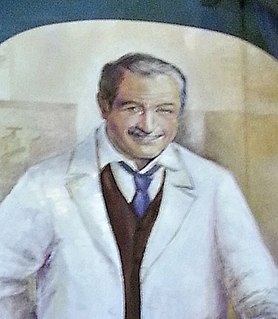
Artémides Zatti was an Italian Roman Catholic professed religious of the Salesians of Don Bosco and a noted pharmacist that emigrated to Argentina in 1897. Zatti became a professed Salesian in 1911 and became well known for his ardent faith and commitment to the sick.
Maria Troncatti was an Italian Roman Catholic religious of the Salesian Sisters of Don Bosco. Troncatti was from a farming family and entered that congregation in 1907; she worked as a nurse during World War I and became part of the missions in Ecuador from 1922 until her death in a plane crash in 1969. Troncatti was beatified in Ecuador on 24 November 2012.

Luigi Versiglia, S.D.B. was an Italian Roman Catholic prelate and professed member from the Salesians of Don Bosco who served as the first Apostolic Vicar of Shaoguan from 1920 until his murder. He was also a former novice master noted for his strict austerities and discipline but for his loving and compassionate care of the poor and defenceless. He led the first Salesian expedition to China in 1906 and remained there until his death functioning for the people in various capacities such as a gardener and barber.
Giuseppe Cognata was an Italian Catholic bishop and member of the Salesians of Don Bosco. He was the founder of the Salesian Oblates of the Sacred Heart of Jesus, a female religious institute of pontifical right. Due to accusations that were proved false many years after, the Congregation for the Doctrine of the Faith condemned Mgr. Cognata to be dismissed of his condition of Bishop on 20 December 1939. Monsignor Giuseppe Cognata in Easter 1962 was reinstated by Pope John XXIII in the Episcopate, after the true came out. The Congregation for the Doctrine of the Faith announced on 17 February 2020 that Pope Francis has given consent to open the Cause of Beatification of Mons. Giuseppe Cognata, S.D.B.
















